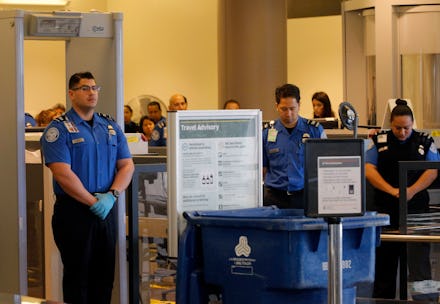The TSA isn't Making Air Travel Any Safer, According to a Government Report

It's that time of year when turkeys scatter in fear and Americans are increasingly scanned, groped, and violated when traveling by air for fear of a terror attack. For the Transportation Security Administration (TSA), 2013 has been a year of walking back failed policies. Earlier this year it proposed and then redacted rules allowing knives on planes. More recently, a Government Accountability Office (GAO) report found that TSA screening procedures are no better at foiling terror threats than random chance. If we're no safer with the procedures than without them, why spend $8 billion annually on a department that's ineffective, incompetent, littered with cronyism and misconduct, and violates civil liberties?
The $1 billion TSA program highlighted in the GOA report was designed to make identification of potential threats even easier. The program, Screening of Passengers by Observation Techniques, entails "talking to people they identify as suspicious to see if they pose a threat." The GAO probe determined that behaviors used to decide potential threats were subjective. The question whether the failure of the program was due to incompetence or an ineffective model remains.
The TSA has been notoriously terrible at catching threats. The failure rate of 70% on guns and knives is comically bad, and in March a TSA agent was able to sneak a bomb in his pants through two checkpoints and a patdown. Given that the rate of terror attacks has fallen exponentially since 1970 and the odds of dying in a terror attack are about one in 20 million, what difference does the TSA make? To put this in perspective, Americans are twice as likely to get struck by lightning as they are to get killed in a terror attack. They are 200 times more likely to die by choking, possibly on bad airline food.
There are entrenched special interests like unions and businesses that profit from the security theater policies of the United States. The union that represents the TSA and the American Federation of Government Employees National (AFGEN) is advocating for increased authority and oversight. Union President J. David Cox released a statement after the LAX shooting calling for more security, a "dedicated TSA law enforcement unit," and said that current protocols "simply won't get the job done."
More security won't do anything if there is system-wide incompetence and a 26% increase in employee misconduct over the past three years. The most transparent example of cronyism within the TSA is the implementation of the liberty-violating body scanners. The company that makes the body scanners, Rapiscan Systems, is a subsidiary of OSI Systems. OSI has seen wondrous growth since the mass implementation of the scanners in late 2010, seeing an $8.1 million revenue increase in the three months ending in September of that year.
There has been rightful concern over the constitutional issues with these devices and the pat-downs administered. There are plenty of similarities to the unconstitutional "Stop and Frisk" law in New York City, and the security model run by the TSA is rife with Fourth Amendment violations. It is an unreasonable search to be subject to a mandatory scan of your location, image, and property and have that information stored by the government. There are plenty of horror stories, and many more that go unnoticed or unreported.
It's one thing to want to be safe, but we are statistically no safer with the TSA. Since the TSA is ineffective, airlines should be able to determine their own ways to ensure security on a flight. Companies could choose and advertise their own security policies, and consumers could choose the providers with which they feel most comfortable. The TSA is an example of governmental bureaucracy gone terribly wrong and a creator of the department agrees. We can save a lot of money, honor the Constitution, and maintain the same level of safety by moving toward a world without it.